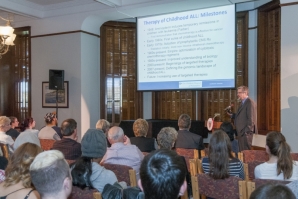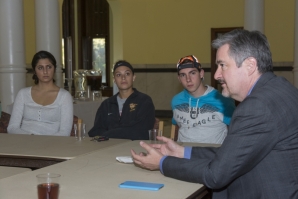
On October 21, the East Parlor filled with students, faculty and staff who wanted to learn more about the topic of Precision Medicine in Pediatric Acute Lymphoblastic Leukemia (ALL). The lecture was part of the acclaimed Biomedical Lecture Series presented twice annually by the Biology Department.
Stephen P. Hunger, M.D., the chief of oncology and director of the Center for Childhood Cancer Research at Children’s Hospital of Philadelphia, spoke for nearly an hour about ALL, its history and the advances being made in treating the disease.
Acute Lymphoblastic Leukemia is the most common childhood cancer in the world today. Thanks to research and new treatments, he cited a 94 percent survival rate. More than 70 percent of children and adolescents in the United States with ALL take part in clinical studies and trials, which have helped raise that survival rate from 4 percent, 50 to 60 years ago.
Dr. Hunger explained that Leukemia is the No. 1 cause of cancer deaths in those under 35 and then he discussed the various subtypes. In the early 1960s and 70s, the first cures were discovered and since the 1980s, scientists have had a better understanding of the biological basis of cancer development and how to attack it therapeutically.
“Advances in medicine continue,” Dr. Hunger said. “Patients are doing better each five years than those in the previous five … as we learn to use the tools we have better, that has led to most of the advances in survival. Cure rates are improved by identifying drugs that will kill cancer cells and have less effect on normal cells.”

The use of targeted therapies (precision medicine) has changed the conversation between doctor and patient when that patient is first diagnosed and has improved outcomes. Medical researchers and physicians all over the country are part of the ongoing efforts to continue to improve those outcomes through studies of the underlying genetic abnormalities that cause cancer and provide more possibilities for the development of appropriate treatments.
The next lecture in the series will be held Monday, March 21 at 2 p.m. in the East Parlor and will feature Nobel Laureate Professor Harald zur Hausen, M.D.
Dr. zur Hausen received the Nobel Prize in Physiology or Medicine in 2008 for his discovery that human papillomavirus (HPV) causes nearly all cases of cervical cancer. His significant research laid the foundation for the discovery of prophylactic vaccines like Gardasil and Cervarix.
— Brenda Lange



